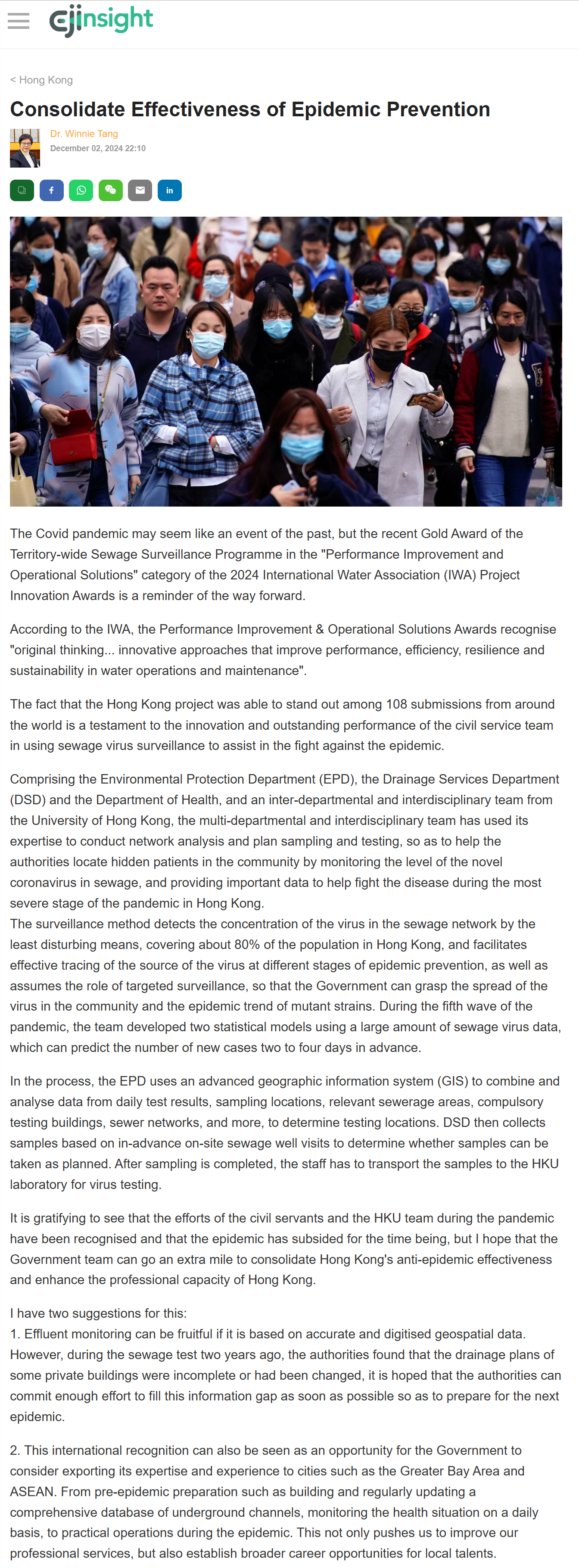網上版請按此

Consolidate Effectiveness of Epidemic Prevention
The Covid pandemic may seem like an event of the past, but the recent Gold Award of the Territory-wide Sewage Surveillance Programme in the "Performance Improvement and Operational Solutions" category of the 2024 International Water Association (IWA) Project Innovation Awards is a reminder of the way forward.
According to the IWA, the Performance Improvement & Operational Solutions Awards recognise "original thinking... innovative approaches that improve performance, efficiency, resilience and sustainability in water operations and maintenance".
The fact that the Hong Kong project was able to stand out among 108 submissions from around the world is a testament to the innovation and outstanding performance of the civil service team in using sewage virus surveillance to assist in the fight against the epidemic.
Comprising the Environmental Protection Department (EPD), the Drainage Services Department (DSD) and the Department of Health, and an inter-departmental and interdisciplinary team from the University of Hong Kong, the multi-departmental and interdisciplinary team has used its expertise to conduct network analysis and plan sampling and testing, so as to help the authorities locate hidden patients in the community by monitoring the level of the novel coronavirus in sewage, and providing important data to help fight the disease during the most severe stage of the pandemic in Hong Kong.
The surveillance method detects the concentration of the virus in the sewage network by the least disturbing means, covering about 80% of the population in Hong Kong, and facilitates effective tracing of the source of the virus at different stages of epidemic prevention, as well as assumes the role of targeted surveillance, so that the Government can grasp the spread of the virus in the community and the epidemic trend of mutant strains. During the fifth wave of the pandemic, the team developed two statistical models using a large amount of sewage virus data, which can predict the number of new cases two to four days in advance.
In the process, the EPD uses an advanced geographic information system (GIS) to combine and analyse data from daily test results, sampling locations, relevant sewerage areas, compulsory testing buildings, sewer networks, and more, to determine testing locations. DSD then collects samples based on in-advance on-site sewage well visits to determine whether samples can be taken as planned. After sampling is completed, the staff has to transport the samples to the HKU laboratory for virus testing.
It is gratifying to see that the efforts of the civil servants and the HKU team during the pandemic have been recognised and that the epidemic has subsided for the time being, but I hope that the Government team can go an extra mile to consolidate Hong Kong's anti-epidemic effectiveness and enhance the professional capacity of Hong Kong.
I have two suggestions for this:
1. Effluent monitoring can be fruitful if it is based on accurate and digitised geospatial data. However, during the sewage test two years ago, the authorities found that the drainage plans of some private buildings were incomplete or had been changed, it is hoped that the authorities can commit enough effort to fill this information gap as soon as possible so as to prepare for the next epidemic.
2. This international recognition can also be seen as an opportunity for the Government to consider exporting its expertise and experience to cities such as the Greater Bay Area and ASEAN. From pre-epidemic preparation such as building and regularly updating a comprehensive database of underground channels, monitoring the health situation on a daily basis, to practical operations during the epidemic. This not only pushes us to improve our professional services, but also establish broader career opportunities for local talents.
Dr Winnie Tang
Adjunct Professor, School of Computing and Data Science; Department of Geography, Faculty of Social Sciences, The University of Hong Kong